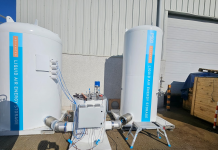Global action to deliver negative emissions technologies is falling far short of what is required to address the climate crisis warns a new study by the newly formed Coalition for Negative Emissions.
The Coalition research, conducted with from McKinsey & Company states that to limit global warming to 1.5°C above pre-industrial levels, as agreed in Paris in 2015, efforts to reduce emissions must be combined with annual negative emissions of up to 1.2Gt by 2025 – equivalent to more than three times the UK’s annual CO2 emissions.
The study shows negative emissions solutions including bioenergy with carbon capture and storage (BECCS), direct air capture and storage (DACS), and natural climate solutions (NCS) such afforestation, are all proven and can each provide at least 1Gt of sustainable negative emissions. In addition to achieving global climate targets, deploying these solutions at scale could create up to 10 million new jobs worldwide.
However, based on the current pipeline of projects, the level of negative emissions required by 2025 in the IPCC’s 1.5°C pathway will likely be missed by 80%. Investment in negative emissions solutions must also increase by 30 times current levels to meet the needs of the 1.5°C pathway. If there is no action until 2030, around 8Gt of negative emissions debt will have been built-up, increasing the costs and disruption to society required to keep global warming within 1.5°C.
In response, over 20 companies, NGOs, investors and trade associations have come together to form the Coalition for Negative Emissions. It aims is to provide policymakers, NGOs and other key stakeholders with a much-needed platform to advance global action to rapidly deploy negative emissions solutions.
Will Gardiner, CEO of Drax Group, a founding member of the Coalition for Negative Emissions, said, “Negative emissions solutions are proven and ready to go but in order to play a critical role in tackling the climate crisis, they must be deployed much faster than current projections. The UK, alongside international partners, has a once in a generation opportunity to lead the world in deploying negative emissions solutions – tackling climate change and saving economies billions while creating millions of new green jobs around the world.”
Commenting on the report’s findings, Dr Steve Smith, Executive Director, Oxford Net Zero, University of Oxford, said, “Net Zero Oxford believes that the scale-up of negative emissions is critical to meeting a 1.5C pathway and must happen immediately. In particular, the pursuit of a portfolio of negative emissions solutions is vital. According to the ‘Oxford Offsetting Principles’, carbon offsetting should transition rapidly from reduction offsets to negative emissions offsets.
“Over time, the focus of negative emissions too should shift, from solutions with a higher risk of reversal (e.g. with biological storage) to those with a lower risk of reversal (e.g. with geological storage). This is important to ensure that stored CO2 does not re-enter the atmosphere, exceeding the 1.5C carbon budget and causing catastrophic climate change.”

The founding members of the Coalition for Negative Emissions are: Agricarbon, Bank of America, Biomass UK, Carbon Engineering, CBI, CCSA, Climeworks, Confor, Drax, Energy UK, Enviva, Heathrow, International Airlines Group, Mineral Products Association, MGT Teesside, Natural Capital Partners, NFU, Storegga, Petrofac, REA, United States Industrial Pellet Association (USIPA), Velocys and Viridor.



